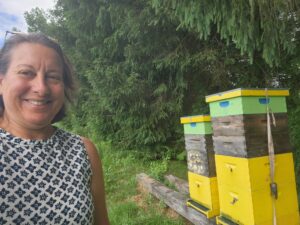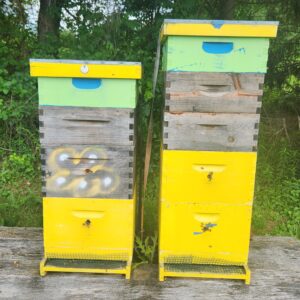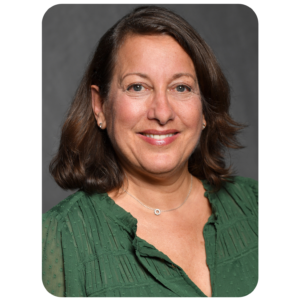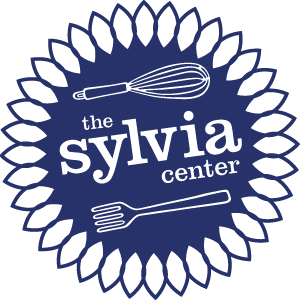 Barbara visiting beehives at TSC’s Learning Garden at Katchkie Farm
Barbara visiting beehives at TSC’s Learning Garden at Katchkie Farm
Written by Barbara Glassman, Executive Director
Regular readers of this communication know that I’m a novice beekeeper. I’ve been keeping bees for three seasons now. It’s a fascinating hobby that gets me outside, moving my body, and requires me to be connected to and a careful observer of the natural world around me. Beehives are complex communities that are a crucial part of our environment, and they’re affected by many environmental factors that are also affecting the crops we grow on farms.
In fact, bees are so important to farms that they’re considered a farm animal in New York State. Bees are the only farm animal that The Sylvia Center maintains on Katchkie Farm to keep our gardens productive and support our visiting students’ learning as they pick, taste, and prepare food for themselves on the farm.
Bees are classified as farm animals because they play a vital role in agricultural sustainability. Our ability to produce and grow food relies heavily on the presence of bees and other pollinators, such as butterflies and hummingbirds. Without these pollinators, the majority of our plants wouldn’t be able to reproduce. Did you know that about one in three bites of food you eat depends on them?
The Sylvia Center maintains two beehives, tucked behind our learning garden next to the pond. You may have seen them if you joined us earlier this month at our summer fundraiser. It’s no coincidence that they’re located in that beautiful spot. Bees need a lot of water to survive, especially in these hot summer months. It’s estimated that bees drink their weight in water every day–and each beehive has approximately 60,000 bees. They also use water to keep cool and to thin their honey before feeding it to their young. That adds up to a lot of water, even for tiny bees!

Bees are also great role models for TSC students. They produce a sweetener, honey, that contains valuable nutrients, is rich in antioxidants, and has a lower glycemic index than table sugar; our students learn that honey can make foods taste great without having to use refined sugar. Bees are also not picky eaters. They are attracted to a large variety of plants and are willing to try new foods, just like we encourage all TSC students to do in each class.
All of us, including every TSC student, are enjoying the bounty of the season right now with our farms in peak production. The bees and other pollinators have been doing their job!
If you haven’t had the chance to visit us at Katchkie, to experience our learning garden and see our bees, please reach out to us to arrange a visit. We’d love you to have you as our guest on the farm!

Until next time, “bee” cool!
Barbara


